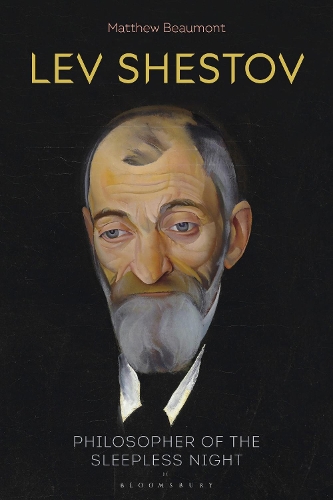
Lev Shestov: Philosopher of the Sleepless Night
(Hardback)
Available Formats
Publishing Details
Lev Shestov: Philosopher of the Sleepless Night
By (Author) Dr Matthew Beaumont
Bloomsbury Publishing PLC
Bloomsbury Academic
17th September 2020
United Kingdom
Classifications
Tertiary Education
Non Fiction
History and Archaeology
Social groups: religious groups and communities
197
Physical Properties
Hardback
216
Width 156mm, Height 234mm
476g
Description
The Jewish philosopher Lev Shestov (1866-1938) is perhaps the great forgotten thinker of the twentieth century, but one whose revival seems timely and urgent in the twenty-first century. An important influence on Georges Bataille, Albert Camus, Gilles Deleuze and many others, Shestov developed a fascinating anti-Enlightenment philosophy that critiqued the limits of reason and triumphantly affirmed an ethics of hope in the face of hopelessness. In a wide-ranging reappraisal of his life and thought, which explores his ideas in relation to the history of literature and painting as well as philosophy, Matthew Beaumont restores Shestov to prominence as a thinker for turbulent times. In reconstructing Shestovs thought and asserting its continued relevance, the books central theme is wakefulness. It argues that for Shestov, escape from the limits of rationalist Enlightenment thought comes from maintaining an insomniac vigilance in the face of the spiritual night to which his century appeared condemned. Shestovs engagement with the image of Christ remaining awake in the Garden of Gethsemane then, is at the core of his inspiring understanding of our ethical responsibilities after the horrors of the twentieth century.
Reviews
Serves as the first overdue step towards bringing to contemporary readers an inspired and original interpretation of an otherwise forgotten philosopher A fresh and concise starting point for engaging with Shestovs works as a whole Beaumonts work deserves a close and attentive reading. * Phenomenological Review *
Beaumont has contributed enormously to defining the 'philosophical force-field' of Shestov's major works. * CHOICE *
A wonderful introduction to Shestovs thought placing this intriguing, but much neglected, figure in the company of Benjamin, Adorno, Deleuze and Badiou. * Ben Ware, Co-Director of the Centre for Philosophy and the Visual Arts, Kings College London, UK and Philosopher in Residence at the Serpentine Galleries, UK *
Lev Shestov created a new science - the psychology of philosophy. He understood individual philosophical discourses as the attempts of their authors to conceal their personal traumas. In his book, Matthew Beaumont brilliantly reconstructs the main themes of Shestov's writing and his influence on European philosophy of the 20th Century. Necessary reading for everybody interested in modern European intellectual history. * Boris Groys, Professor of Russian and Slavic Studies, New York University, USA *
Matthew Beaumont reflects on what we can learn from an insomniac who has spent his sleepless nights trying to unravel the stems of suffering and brutality. Shestov is beset by missed encounters, and Beaumont comes to make good those absences, tangling Shestov's thoughts with the moral and critical thinking of his contemporaries and ours. * Esther Leslie, Professor in Political Aesthetics, Birkbeck University of London, UK *
Matthew Beaumonts book on Shestov weaves the thread of sleeplessness into a gripping reconstruction of the philosophers journey across some of the defining Gethsemane moments of the twentieth-century with a political commentators sense of momentous encounters. * Ramona Fotiade, Reader in French, University of Glasgow, UK *
Author Bio
Matthew Beaumont is Professor of English at University College London, UK and the author of several books, including two on the topic of late nineteenth-century utopianism. He has also edited several essay collections and published numerous articles in scholarly journals.
